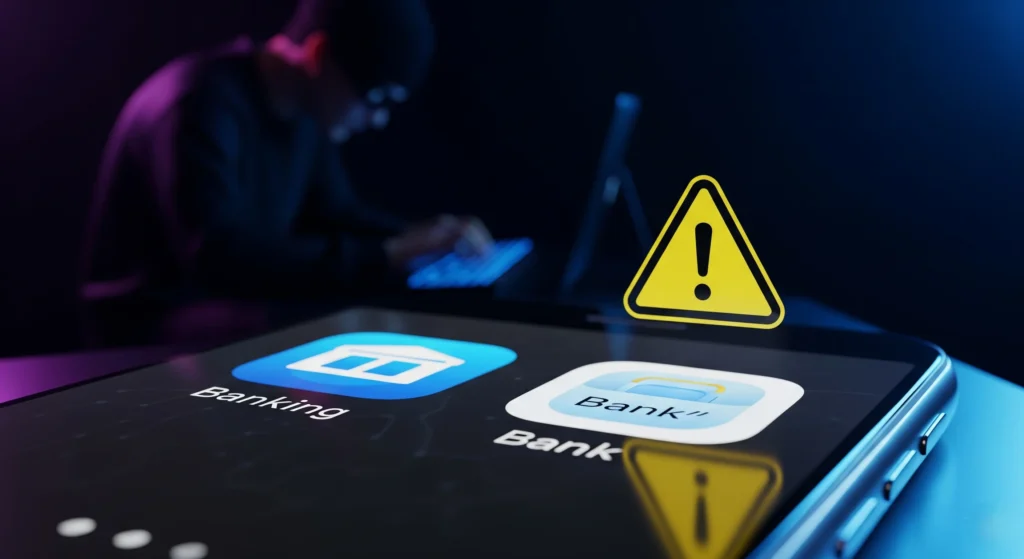Every smartphone user, no matter how tech-savvy or cautious, eventually faces a critical question: how can we protect ourselves from the rising threat of fake loan apps? In an era where financial convenience is just a tap away, relying solely on flashy app promises or quick approvals is no longer safe-it’s time to prioritise awareness and digital vigilance.
Fake loan apps are reshaping cyber fraud, preying on people’s urgent financial needs through hidden charges, harassment, and data misuse. From draining bank accounts to causing emotional trauma, these apps pose serious risks.
So, why does knowing the list of fake loan apps matter? In this guide, we’ll uncover the Top 15 Fake Loan Apps in India and how you can stay safe.
What are Fake Loan Apps?
Fake loan apps are fraudulent mobile applications designed to trick users into borrowing money under false or exploitative terms. Unlike legitimate lending platforms, these apps often promise instant loans with minimal documentation, targeting people in urgent need of cash.
Once installed, they may demand excessive permissions, misuse personal data, or charge hidden fees and extremely high interest rates. Many also harass borrowers through aggressive recovery tactics, including blackmail and threats. Some don’t even provide loans but steal sensitive information for identity theft.
Operating without proper licenses or regulatory approvals, fake loan apps pose severe financial and psychological risks to users. Identifying and avoiding such apps is essential for protecting one’s money, privacy, and overall digital safety.
How to Protect Yourself from Fake Loan App Scams?

- Check App Legitimacy– You must always ensure that the loan application is registered with RBI or other licensed financial institutions. Only download apps in the official app stores without using third-party APKs or dubious sites.
- Research the Lender– Before applying, research the background, reviews and website of the lender. Authentic lenders also have clear contact details, office location, and customer service, unlike the other fake applications that conceal them.
- Read Terms Carefully– Before going any further, read the terms of the loan, interest rates, fees and repayment schedules. Typically, predatory interests and deceptive charges are concealed in ambiguous or misleading contracts in false applications.
- Check Permissions– Do not install apps that require unwarranted permissions such as access to contacts, gallery, or messages. Authentic financial applications will never ask to see unnecessary details, whereas fraudsters use the information to harass or extort money.
- Avoid Unrealistic Offers– Be wary of apps that claim to offer approval instantly, no documentation, or guaranteed loans. The latter are warning signals, where the real lenders abide by the checks and balances and adhere to financial rules.
- Report Suspicious Apps– In case you come across or download a counterfeit loan application, report it to RBI or cybercrime security agencies or app stores. Reporting is protective of others and regulative.
- Use Trusted Security Tools– Installing antivirus or mobile security applications to identify and prevent malicious applications. Always update your device software and turn on Google Play Protect to offer further protection against threats.
- Seek Legal Loans– Select loans by the banks, NBFCs or RBI-registered applications posted on the official portals. Licensed financial institutions offer consumer protection, controlled interest rates, and clear terms of repayment, preserving financial security.
How to Report Cyber Fraud?
- Gather Evidence– Gather all the evidence such as screen shots, email messages, transaction IDs, messages, and details of suspicious apps. Good documentation reinforces your argument and supports the authorities in their investigation of the fraud effectively and correctly.
- Report on National Cybercrime Portal– Go to the official National Cybercrime Reporting Portal (cybercrime.gov.in) and make a complaint. Give all the information including personal data, description of the incident and evidence to take immediate action.
- Call Cyber Helpline Number– Dial the free cybercrime helpline number 1930 as soon as you realise that something is wrong. Rapid reporting enhances the likelihood of preventing illegal transactions and tracking down fraudsters.
- Inform Local Police Station– Register a First Information Report (FIR) or complaint with your closest police station. District level cyber cells help victims in fraud related investigations where prosecution is made against the criminals.
- Alert Your Bank– Contact your bank as soon as you can to freeze or lock down hacked accounts. Disclose information about fraudulent transactions to commence chargebacks, halt fraudulent transfers, and secure the balance of the account.
- Report to RBI or Relevant Regulator– In case of a banking or loan app fraud, report to Reserve Bank of India (RBI) or other applicable regulators. This will create increased actions against unlicensed financial platforms.
- App Store Reporting– Report fake or malicious apps on Google Play Store or Apple App Store. This will assist in removing malicious applications within a short time, and this will save more users becoming victims.
- Raise Awareness– Spread the word to your friends, family, or social media in a responsible manner. Teaching others about fraud schemes means that less individuals will succumb to them, creating a better defense against cybercrime.
List of Top 15 Fake Loan Apps in India
1. Udhar Loan
Udhar Loan has recently been flagged in police investigations for its role in organised cyber fraud. Operating under the guise of quick credit, it lures users with instant loan promises and minimal verification.
Once installed, the app demands intrusive permissions, harvesting contacts and personal data. Borrowers are then subjected to exploitative interest rates, hidden fees, and aggressive recovery tactics. Funds are often laundered through mule bank accounts and cryptocurrency, making tracking difficult.
The lack of RBI registration and physical office verification marks it as a high-risk scam platform. Victims report harassment, blackmail, and long-term financial vulnerability.
2. Rupee Factory
Rupee Factory is among the illegal apps linked to a Chinese-backed cybercrime racket uncovered in India. Marketed as a digital lending platform, it exploits unsuspecting borrowers through excessive charges and predatory interest rates.
Investigations revealed its operators used fake loan disbursements as a cover for large-scale money laundering. Users granting access to personal files, contacts, and SMS data were later threatened and extorted during repayment demands.
Its unlicensed status and association with fraudulent cryptocurrency transactions highlight its criminal intent. Complaints to cybercrime portals frequently cite intimidation and reputational damage. Rupee Factory exemplifies how fraudulent apps weaponise desperation for short-term credit.
Suggested Read: Best Loan Apps in India
3. Quick Loan
Quick Loan has been exposed as a fraudulent mobile application tied to scams across multiple Indian states. Promising “instant loans without paperwork,” it lures financially distressed users into downloading its app, which requires dangerous levels of phone access.
Victims report that after small loan disbursements, they were forced into paying inflated interest, while their personal data was exploited for blackmail. Cybercrime authorities found links between Quick Loan and cryptocurrency laundering schemes.
Lacking RBI approval or NBFC licensing, the app continues to resurface under different names. Illegal recovery agents frequently subject borrowers to severe psychological strain, harassment, and defamation.
4. Credit Bee
Credit Bee, though sharing its name with a legitimate NBFC-registered platform, has spawned counterfeit versions operating illegally in India. Fraudsters clone the brand to build trust, then exploit users with hidden fees, inflated interest, and false approval guarantees.
Victims often discover loan terms are manipulated after disbursement, making repayment nearly impossible. Complaints highlight aggressive harassment, including calls to family and employers.
Cybercrime units warn that fake Credit Bee apps are being used to siphon money through mule accounts and cryptocurrency channels. Borrowers face financial losses, reputational damage, and severe privacy violations, underscoring the danger of lookalike lending apps. Experts stress the importance of robust cybercrime security measures, including app verification and digital awareness, to protect users from such fraudulent platforms and ensure safer online financial transactions.
5. Flash Loan – Quick Money Loan
Flash Loan – Quick Money Loan has gained notoriety for its predatory practices, often targeting smartphone users through aggressive ads. Promising “fast cash within minutes,” it bypasses regulatory norms, never requiring formal verification.
Once users borrow, the app imposes inflated repayment demands, sometimes double the borrowed amount. Victims have reported cyberbullying, identity theft, and threats to release private photos collected through app permissions.
Authorities have flagged it in multiple scam advisories, yet new versions frequently reappear. Its operations remain outside RBI’s registered lender list, making it unsafe for borrowers. Users face financial exploitation, extortion, and lasting reputational harm.
6. Easy Credit
Easy Credit frequently appears on cybercrime and consumer awareness portals for its role in loan scams. Marketed as a convenient app for small-ticket credit, it deceives borrowers with hidden charges and unrealistic repayment schedules.
Victims report harassment from recovery agents who use personal contacts, images, and messages to blackmail defaulters. The app also demands excessive permissions unrelated to lending, raising data misuse concerns.
With no RBI license or physical presence, Easy Credit functions outside legal frameworks. Reports link it to cross-border fraud networks, intensifying risks. Borrowers are left with drained finances, ruined reputations, and compromised digital security.
7. Angel Loan
Angel Loan, flagged as a fake app by cybercrime watchdogs, exploits borrowers under the pretext of instant financial help. Users are enticed with “quick disbursal, no paperwork,” but the reality is hidden charges and astronomical interest rates.
Victims often lose money upfront in processing fees or face harassment after small loans are disbursed. Reports also indicate misuse of personal data collected during registration, which is later weaponized for extortion.
Lacking RBI authorization, Angel Loan operates illegally, making legal recourse difficult. Victims commonly experience reputational harm, stress, and even threats to family members, confirming its role in organized digital fraud.
8. Apna Paisa
Apna Paisa has been identified as part of India’s growing fake loan app ecosystem. Masquerading as a micro-lending platform, it draws in borrowers with false promises of instant approval and flexible repayment.
Victims soon face inflated EMIs, unauthorized deductions, and harassment from recovery agents. Investigations reveal the app often misuses access to contacts and personal data for threats and public shaming. Its lack of NBFC registration under RBI guidelines highlights its illegitimacy.
Complaints filed on cybercrime portals describe blackmail attempts and constant pressure to repay unjustified charges. Borrowers face lasting financial, legal, and mental distress after engagement.
9. Cash Fish
Cash Fish is frequently mentioned in scam alerts and RBI advisories for its fraudulent lending operations. While it markets itself as a “personal loan solution,” users are subjected to exploitative repayment demands and hidden charges.
Borrowers have reported harassment through WhatsApp, threatening calls, and exposure of personal photos taken from app permissions. The platform lacks any official RBI licensing, operating illegally under multiple brand variations. Investigators also link it to foreign cybercrime groups exploiting Indian borrowers.
Victims often face debt traps, drained accounts, and psychological harassment. Cash Fish exemplifies how fake loan apps exploit vulnerabilities in the digital finance ecosystem.
Suggested Read: Payment Gateways in India
10. Raise Cash App
Raise Cash App appears in multiple fake loan app blacklists, identified as a platform exploiting borrowers’ urgent financial needs. It markets “fast, paperless loans” but charges exorbitant interest rates and hidden processing fees.
Users granting permissions unknowingly expose sensitive contacts and images, later used for harassment when repayments falter. Reports filed with cybercrime units highlight threats, extortion, and reputational damage caused by this app.
With no RBI registration, Raise Cash App operates illegally, often shutting down and reappearing under different names. Victims face financial exploitation, loss of digital privacy, and severe emotional stress after interacting with this fraudulent platform.
11. Minute Cash
Minute Cash markets itself as a quick loan provider but is consistently flagged as fraudulent across Indian consumer forums. It tempts borrowers with “instant approval, zero paperwork,” yet demands excessive permissions and high upfront fees.
Borrowers often receive small disbursements, followed by repayment demands far exceeding the loan amount. Reports detail harassment, threatening calls, and blackmail using personal data harvested from devices. Lacking RBI licensing, Minute Cash has no legal standing as a lending institution.
Cybercrime investigations link it to foreign scam operators, making refunds impossible. Victims suffer financial losses, reputational harm, and long-term psychological distress.
12. Infinity Cash
Infinity Cash is notorious for trapping borrowers with predatory lending practices under the guise of quick financial assistance. Victims report unrealistic repayment schedules, aggressive debt collection, and unauthorized access to contacts.
Complaints reveal blackmail tactics, including threatening to leak private information to social circles. Despite presenting itself as a legitimate platform, Infinity Cash lacks RBI authorization and functions illegally. Cybercrime reports connect it to fraudulent international networks exploiting Indian users.
Borrowers face impossible repayment demands, identity theft risks, and harassment. Its recurring presence in scam alerts underscores its role as a serious threat to consumer financial safety.
13. Kredit Mango
Kredit Mango has been highlighted as one of the fake loan apps banned by Google Play in India following RBI pressure. Despite removal, clones often resurface under slightly altered names.
Victims describe misleading interest rates, unlawful deductions, and threatening behavior from recovery agents. The app harvests personal data under the guise of KYC, which is later weaponized. With no NBFC registration, Kredit Mango operates outside the legal financial framework.
Complaints filed with cybercrime portals frequently cite harassment, reputational harm, and extortion attempts. Users who engage with the app often face financial loss and deep psychological stress.
14. Cash Ray
Cash Ray frequently appears on lists of banned loan apps in India for its fraudulent practices. It markets “instant personal loans” but hides excessive interest rates and unlawful service fees.
Victims often report receiving much smaller disbursals than promised, followed by aggressive recovery harassment. The app demands unnecessary phone permissions, exposing users’ contacts and photos, later used for intimidation. Cybercrime reports connect it to foreign-operated fraud networks laundering funds through cryptocurrency.
With no RBI registration, Cash Ray lacks any legal standing. Borrowers face serious financial exploitation, emotional harassment, and long-term risks to personal and digital security.
15. CashBean
CashBean, one of the most infamous fake loan apps, has been widely reported for its unethical practices. Victims describe small loan disbursements followed by inflated repayment demands and abusive collection tactics.
The app misuses permissions, leaking contacts and private photos to blackmail defaulters. Authorities have flagged CashBean for operating without RBI registration, linking it to cross-border fraud syndicates. Complaints filed on cybercrime portals highlight severe harassment, including threats to family members.
Borrowers not only lose money but also endure emotional trauma and reputational harm. CashBean remains a symbol of the broader fake loan app menace plaguing India’s digital ecosystem.
Ending Thoughts
Fake loan apps in India have emerged as a major cybercrime threat, exploiting vulnerable borrowers through deceptive promises, predatory lending, and harassment. Operating without RBI registration, these platforms charge hidden fees, impose exploitative interest rates, and misuse sensitive data for extortion. Many are linked to organised fraud networks, with funds laundered through mule accounts and cryptocurrency, making enforcement difficult.
Victims often suffer not just financial losses but also severe reputational harm and emotional trauma. The recurring reappearance of banned apps under new names underscores the urgent need for vigilance. Reporting suspicious apps, verifying lenders through RBI lists, and spreading awareness are crucial steps to safeguard digital borrowers from these predatory financial traps.
FAQs
How can I identify a fake loan app?
Fake loan apps usually promise instant approvals with no documentation, demand unnecessary phone permissions, and are not listed on the RBI-registered NBFC database. They often hide fees and interest rates.
What should I do if I fall victim to a fake loan app?
Immediately report the fraud on the National Cybercrime Portal (cybercrime.gov.in), call the helpline 1930, notify your bank to secure your accounts, and file a complaint at the nearest police station.
Are all instant loan apps unsafe?
No. Only unregistered, unauthorized apps are fraudulent. Legitimate loan apps are run by RBI-registered NBFCs or banks, clearly disclose terms, and never misuse personal data or harass borrowers.

